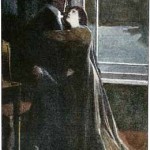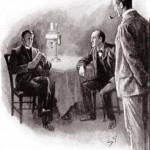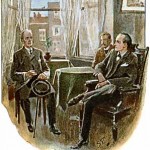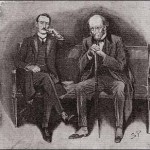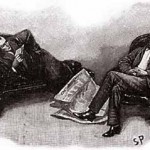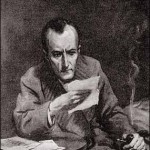“Well, perhaps it won’t be so difficult, after all. There is nothing more to be done here, Watson. I think we might drive round to the offices of the Daily Telegraph, and so bring a good day’s work to a conclusion.”
Mycroft Holmes and Lestrade had come round by appointment after breakfast next day and Sherlock Holmes had recounted to them our proceedings of the day before. The professional shook his head over our confessed burglary.
“We can’t do these things in the force, Mr. Holmes,” said he. “No wonder you get results that are beyond us. But some of these days you’ll go too far, and you’ll find yourself and your friend in trouble.”
“For England, home and beauty–eh, Watson? Martyrs on the altar of our country. But what do you think of it, Mycroft?”
“Excellent, Sherlock! Admirable! But what use will you make of it?”
Holmes picked up the Daily Telegraph which lay upon the table.
“Have you seen Pierrot’s advertisement to-day?”
“What? Another one?”
“Yes, here it is:
“To-night. Same hour. Same place. Two taps. Most vitally important. Your own safety at stake.
“Pierrot.
“By George!” cried Lestrade. “If he answers that we’ve got him!”
“That was my idea when I put it in. I think if you could both make it convenient to come with us about eight o’clock to Caulfield Gardens we might possibly get a little nearer to a solution.”
One of the most remarkable characteristics of Sherlock Holmes was his power of throwing his brain out of action and switching all his thoughts on to lighter things whenever he had convinced himself that he could no longer work to advantage. I remember that during the whole of that memorable day he lost himself in a monograph which he had undertaken upon the Polyphonic Motets of Lassus. For my own part I had none of this power of detachment, and the day, in consequence, appeared to be interminable. The great national importance of the issue, the suspense in high quarters, the direct nature of the experiment which we were trying–all combined to work upon my nerve. It was a relief to me when at last, after a light dinner, we set out upon our expedition. Lestrade and Mycroft met us by appointment at the outside of Gloucester Road Station. The area door of Oberstein’s house had been left open the night before, and it was necessary for me, as Mycroft Holmes absolutely and indignantly declined to climb the railings, to pass in and open the hall door. By nine o’clock we were all seated in the study, waiting patiently for our man.
An hour passed and yet another. When eleven struck, the measured beat of the great church clock seemed to sound the dirge of our hopes. Lestrade and Mycroft were fidgeting in their seats and looking twice a minute at their watches. Holmes sat silent and composed, his eyelids half shut, but every sense on the alert. He raised his head with a sudden jerk.
“He is coming,” said he.
There had been a furtive step past the door. Now it returned. We heard a shuffling sound outside, and then two sharp taps with the knocker. Holmes rose, motioning us to remain seated. The gas in the hall was a mere point of light. He opened the outer door, and then as a dark figure slipped past him he closed and fastened it. “This way!” we heard him say, and a moment later our man stood before us. Holmes had followed him closely, and as the man turned with a cry of surprise and alarm he caught him by the collar and threw him back into the room. Before our prisoner had recovered his balance the door was shut and Holmes standing with his back against it. The man glared round him, staggered, and fell senseless upon the floor. With the shock, his broad-brimmed hat flew from his head, his cravat slipped down from his lips, and there were the long light beard and the soft, handsome delicate features of Colonel Valentine Walter.
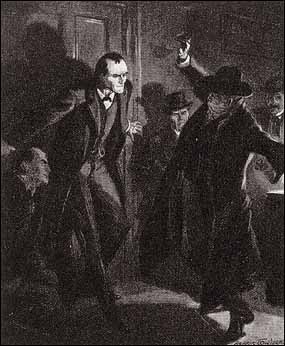
Holmes gave a whistle of surprise.
“You can write me down an ass this time, Watson,” said he. “This was not the bird that I was looking for.”
“Who is he?” asked Mycroft eagerly.
“The younger brother of the late Sir James Walter, the head of the Submarine Department. Yes, yes; I see the fall of the cards. He is coming to. I think that you had best leave his examination to me.”
We had carried the prostrate body to the sofa. Now our prisoner sat up, looked round him with a horror-stricken face, and passed his hand over his forehead, like one who cannot believe his own senses.
“What is this?” he asked. “I came here to visit Mr. Oberstein.”
“Everything is known, Colonel Walter,” said Holmes. “How an English gentleman could behave in such a manner is beyond my comprehension. But your whole correspondence and relations with Oberstein are within our knowledge. So also are the circumstances connected with the death of young Cadogan West. Let me advise you to gain at least the small credit for repentance and confession, since there are still some details which we can only learn from your lips.”
The man groaned and sank his face in his hands. We waited, but he was silent.

